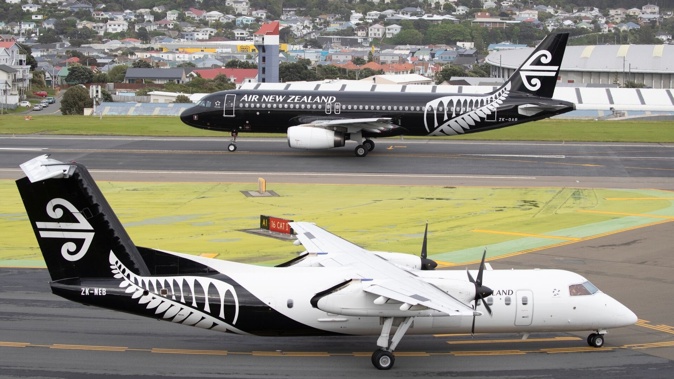
Consumer NZ says Air NZ’s “virtual monopoly” of domestic aviation is pushing up prices and warrants a government inquiry.
It has written to the Minister of Commerce and Consumer Affairs Andrew Bayly urging him to direct the Commerce Commission to undertake a market study into NZ’s aviation sector. Similar inquiries have been held into the fuel and supermarket sectors.
Consumer NZ chief executive Jon Duffy said in sectors where any single company holds a significantly high market share, such as Air NZ, which holds an 86% share, there is a risk competition isn’t working as it should to keep prices reasonable.
In the letter he says: “Air NZ has significant market power. In recent times, consumers have faced ever increasing costs to fly.
 Air NZ dominates domestic main trunk and regional routes. Photo / Brett Phibbs
Air NZ dominates domestic main trunk and regional routes. Photo / Brett Phibbs
“While there are a range of factors influencing price, there is limited transparency. Problematic pricing and opaque cost structures contribute to our view that an in-depth study into factors affecting competition is urgently necessary.”
The airline has been approached for comment as has Bayly. Previously Air NZ has said it was happy to ‘’open the books’' and the minister didn’t rule out a market study.
Consumer says it is concerned by the findings of its own research into Air NZ’s use of dynamic pricing around school holidays.
In response to that research, Air NZ last week said demand-based pricing was not unique to the airline.
“School holidays see demand soar and this approach allows us to manage supply and demand. We would love to add more capacity over these busy periods, however, with seven of our aircraft currently out of service due to global engine supply issues, there are no spare aircraft to add to the schedule,” said a spokesperson.
Today Duffy said a market study would determine to what extent Air NZ may be taking advantage of its virtual monopoly.
“For many New Zealanders, there’s Air NZ or nothing – and high fares are affecting our regions.
“Our research has identified numerous red flags affecting competition in the sector that must be put under the microscope to assure consumers the cost of flying in NZ is truly fair.”
In addition to the limited choice New Zealanders have when it comes to air travel, Consumer was concerned high barriers to entry reduce the likelihood that other carriers will enter the market to compete with Air NZ.
Jetstar competes on domestic main trunk routes but gave up on a short-lived loss-making regional operation before the pandemic.
The government is a 51% shareholder in Air NZ.
“We understand Air NZ is facing its own set of challenges, like constrained fleet availability and increasing costs in some areas.
“Our concern remains – NZ has the most concentrated domestic aviation market in the world¹, so when Air NZ says its pricing is fair, we are forced to take their word for it.
“A market study would tell us whether we can rely on what we’re being told.
“A Commerce Commission market study won’t solve anti-competitive behaviour, but getting information about how competition is working in the sector will highlight what interventions may be necessary and provide confidence New Zealanders aren’t being ripped off.”
Consumer cited Sabre Market Intelligence for 2023 in domestic markets with more than 5 million seats operated by airlines.
New Zealand had the most concentrated domestic aviation market in the world with one airline holding 86% of seats in the market.
Take your Radio, Podcasts and Music with you









